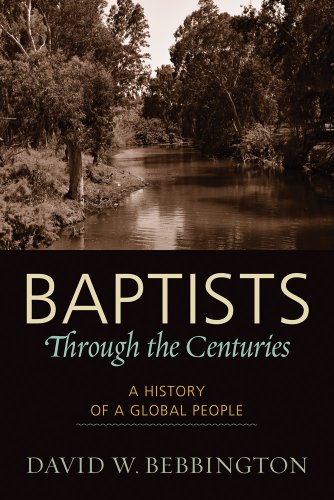
By
David Bebbington
ISBN
978-1-60258-204-0
Reviewed
by Clint Walker
Baptist
identity has been at the heart of a lot of discussions in Baptist churches and
seminaries in the last several years, especially in American Baptist and
Southern Baptist circles. It only makes sense, then, that Baptists need to do a
careful job of understanding and communicating about their history. David
Bebbington, a church historian from England that has been teaching Baptist
History at Truett Theological Seminary, has written an excellent book on the
subject. Baptists Through the Centuries:A History of a Global People is even-handed, balanced, well-organized, and thoughtful.
It is a book I would recommend to anyone wanting to know where Baptists come
from, what they have been about, and what that means for Baptist and American
churches today.
The
first several chapters of the book attempt to cover one formational issue for
Baptists in each century. Then, as the
author moves toward the late nineteenth century through the early twenty-first
century, he tackles several topics in recent Baptist history that have effected
how Baptists see themselves and do ministry.
As
I read, I was hooked by the first chapter. Much of this chapter was about
whether Baptist churches have their roots in Anabaptist or Separatist history.
This was helpful for me to think about, mostly because I do have some
Anabaptist leanings. What I discovered is what I suspected, namely that the
family tree that the Baptists were born out is much broader and more dynamic
than some historians would have their readers believe.
I
was also intrigued about the Baptists rather slow acceptance of revivalism in
both America and Europe. Given the amount of churches I have attended that are
Baptist and have spoken about revivals, love gospel songs, and long, drawn-out
invitations I expected this way of worshipping to at the core of Baptist development
from the start. In fact, it was not.
Bebbington’s
approach to the Baptist identity/freedoms issue is surprisingly balanced
considering he is writing for Baylor University Press. He rightly appreciates
Shurden’s
Four Fragile Freedoms as an important work in the ongoing battle between fundamentalists and those who are not as “confessional”, but does not go so far as to endorse it as a landmark historical summary of Baptist belief and history. He also points out that Baptist churches have developed with more episcopal-styled church governments in places such as Moldova, and other formerly communist countries.
Four Fragile Freedoms as an important work in the ongoing battle between fundamentalists and those who are not as “confessional”, but does not go so far as to endorse it as a landmark historical summary of Baptist belief and history. He also points out that Baptist churches have developed with more episcopal-styled church governments in places such as Moldova, and other formerly communist countries.
All
in all, I appreciated Bebbington’s writing. Baptists Through the Centuries: A History of a Global People is
appreciative of Baptist history and development without being overwhelming. It
is wise and honest, and deftly avoids agenda-driven pitfalls that many American
authors bring to their discussions of what it means to be Baptist. In other
words, Bebbington is a good, honest historian that deserves to be heard by a
broad audience.



No comments:
Post a Comment